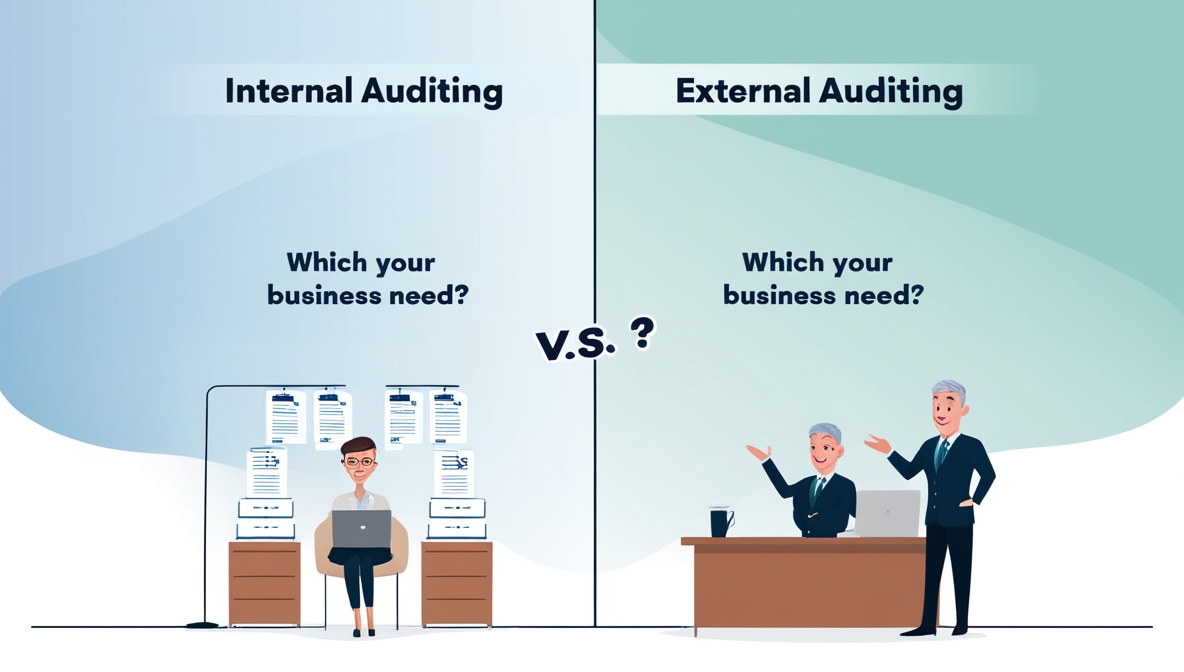
Key Differences Between Internal and External Auditing: Which Does Your Business Need?
Audits are essential for assessing the accuracy and compliance of a company’s financial practices, but not all audits serve the same purpose. Internal and external audits have distinct goals, methods, and outcomes. Understanding the differences between the two can help business owners determine which is most appropriate for their current needs. Here’s a breakdown of what each type entails and when businesses might consider each.

What is an Internal Audit?
An Internal Audit is a self-evaluation process that provides an organization with insight into its operations, financial health, and regulatory compliance. These audits are conducted by internal auditors or specialized teams within the organization.
Key Purposes of an Internal Audit:
- Risk Management: Internal audits help identify and mitigate potential risks within business operations, such as process inefficiencies, cybersecurity threats, and regulatory non-compliance.
- Process Improvement: These audits review business processes to ensure they’re running effectively and in line with company goals.
- Compliance Monitoring: Internal audits verify that the company complies with industry standards, regulatory policies, and internal protocols.
- Management Support: Internal auditors act as a support system for management, providing actionable insights for strategic planning and better decision-making.
When Should a Business Consider an Internal Audit? Internal audits are typically conducted on a routine basis, often annually or quarterly. Businesses should consider an internal audit when:
- They’re implementing new processes or systems that require oversight.
- They want to identify operational inefficiencies or areas for improvement.
- They need to ensure compliance with industry regulations and internal policies.

What is an External Audit?
An External Audit is conducted by independent, third-party auditors who evaluate a company’s financial records to ensure they are accurate and comply with accounting standards. The primary purpose of an external audit is to provide assurance to external stakeholders—like investors, creditors, and regulatory bodies—that the company’s financial statements are accurate and fair.
Key Purposes of an External Audit:
- Financial Accuracy: External audits verify that the company’s financial records are accurate and fairly represent its financial position.
- Transparency for Stakeholders: An external audit provides credibility, showing investors, lenders, and other stakeholders that the company’s finances are being managed responsibly.
- Regulatory Compliance: External auditors ensure that the company adheres to financial reporting standards and government regulations, such as GAAP or IFRS.
- Detecting Fraud: While not always their primary purpose, external audits can uncover signs of fraud or financial misconduct.
When Should a Business Consider an External Audit? External audits are typically required for publicly traded companies or companies seeking financing, but they can benefit other businesses as well. A business should consider an external audit when:
- It needs to provide verified financial information to potential investors or lenders.
- It’s preparing to go public or wants to increase its market credibility.
- It requires compliance verification for regulatory bodies or industry standards.
Key Differences Between Internal and External Audits
| Aspect | Internal Audit | External Audit |
|---|---|---|
| Conducted By | Internal auditors (employees or internal teams) | Independent third-party auditors |
| Purpose | Operational review, risk management, compliance | Financial accuracy, regulatory compliance, fraud detection |
| Focus | Processes, risk, compliance | Financial statements and accuracy |
| Frequency | Ongoing or periodic (quarterly, annually) | Typically annual |
| Reporting | Internal management | External stakeholders (investors, creditors, regulators) |
| Regulatory Requirement | Optional (except in some industries) | Mandatory for public companies |
| Cost | Typically lower, in-house | Generally higher due to external hiring |
Which Does Your Business Need?
- For Process Improvement and Risk Management: An Internal Audit is more appropriate. It helps you proactively manage risks, improve processes, and ensure compliance with internal and industry standards.
- For Credibility with External Stakeholders: An External Audit is essential if you need to provide stakeholders with an objective assurance of financial accuracy. This is often required for securing financing, attracting investors, or meeting regulatory requirements.
- For Large, Public, or Regulated Companies: Large companies or publicly traded businesses are often required to undergo both types of audits. Internal audits help with ongoing compliance, while external audits assure stakeholders of financial transparency.
- For Startups or SMEs: Small to mid-sized businesses (SMEs) or startups might start with internal audits to streamline operations and reduce risks, and only undergo external audits when seeking financing or expanding into regulated markets.
Conclusion: Choosing the Right Audit for Your Needs
Both internal and external audits play valuable roles in supporting a business’s financial health and credibility, yet they focus on different aspects. Internal audits offer an inward look, identifying areas for operational improvement, while external audits provide an independent assurance to stakeholders regarding the company’s financial integrity.
Consider the nature of your business, your goals, and your regulatory requirements when choosing which audit is right for you. An internal audit can foster internal growth and efficiency, while an external audit builds trust and credibility with external parties. Combining both, when feasible, provides a comprehensive approach to risk management, compliance, and financial health.
